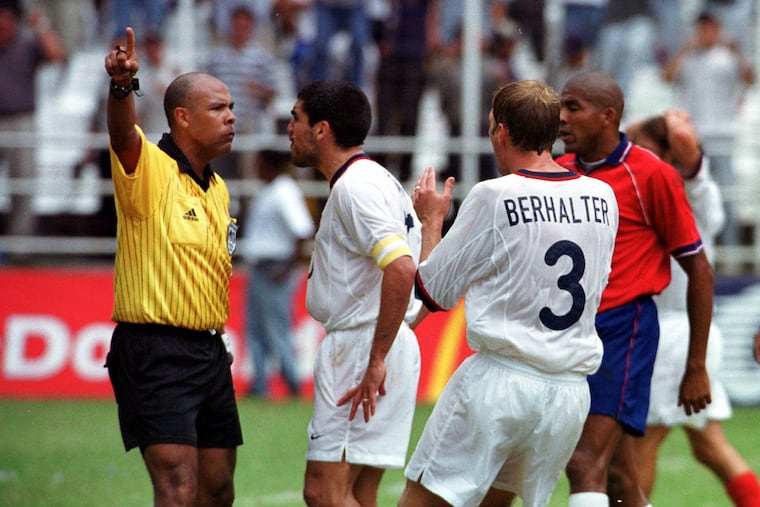The U.S. men’s soccer team’s final World Cup qualifier is also the end of an era
Wednesday's game will be the last men's World Cup qualifier the U.S. plays until at least 2028. It could also be the Americans' last dramatic qualifier ever, with a format change coming in the future.

At last, the end is here for the U.S. men’s soccer team.
The end of the 14-game World Cup qualifying tournament roller coaster.
The end — barring a barely imaginable six-goal loss to host Costa Rica on Wednesday — of the Americans’ World Cup drought.
(Which it’s worth remembering is only one World Cup, even though it’s been eight years since their last appearance. It says much about how many new fans have come to the sport since 2014 that they haven’t fully processed that history.)
And along with all that, the end of an even more significant era in American — indeed, all of North American — soccer history.
If, as everyone expects, the U.S. men don’t have to qualify for the 2026 World Cup that they’re co-hosting with Canada and Mexico, Wednesday’s game will be the last qualifier that the team plays for at least six years.
In addition, because the men’s World Cup is expanding from 32 teams to 48 in 2026, the number of teams qualifying from Concacaf will rise significantly. That means the qualifying campaign will have lower stakes.
Concacaf currently gets three direct berths and one ticket to an intercontinental playoff. The expectation is that in 2026, the region will send the three co-hosts, three more direct berths, and two teams to the intercontinental playoffs.
» READ MORE: The U.S. all but sealed World Cup qualification with a 5-1 rout of Panama
The regional governing body hasn’t yet decided exactly what the qualifying format will be for 2026 and beyond. But officials know it’s not practical to have the traditional round-robin finale when so many teams earn prizes.
Since the World Cup grew to 32 teams in 1998, Concacaf’s grandest soccer theater has been the “Hexagonal” qualifying format: a set of small groups that qualify six teams to a final round-robin battle. This year, the Hexagonal grew to an eight-team “Octagonal” because the pandemic shortened the qualifying window.
Every one of those final-round clashes was a big deal across the continent, from Costa Rica and Honduras to the eternal rivalry between the United States and Mexico. Indeed, for many countries — El Salvador, Canada, Jamaica, Trinidad & Tobago, and others — simply getting to the final round was viewed as earned, not a birthright.
“I think that the qualifying process has been exciting — exciting for fans, exciting for the players, for coaches,” U.S. manager Gregg Berhalter said Tuesday. “Part of U.S. soccer’s history is based on what we’ve done in qualifying.”
It’s fitting that the United States’ Octagonal finale will come in the country where it has the worst road record. While Mexico is the Americans’ big rival, the visitors have earned ties at the Estadio Azteca in their last three trips there. Costa Rica is the true house of horrors: zero wins and nine straight losses since the lone tie in 1985.
Some U.S. managers might not think that’s a big deal when the main objective is to simply get Wednesday’s game over with and officially seal qualification. But for Berhalter, the winless streak matters a lot. Fourteen of his 44 U.S. national team caps came in World Cup qualifiers, including a notorious 2000 visit to Costa Rica’s old Estadio Saprissa bandbox. With the game tied at 1-1 in the closing moments, Berhalter was whistled for a questionable handball that gave Costa Rica a game-winning, 91st-minute penalty kick.
“One of the craziest atmospheres I’ve ever played in,” Berhalter said. “I personally really enjoyed playing in atmospheres like that.”
» READ MORE: Christian Pulisic’s hat trick vs. Panama was a statement by the USMNT’s biggest star
How much has happened since then? One of Berhalter’s teammates that day was U.S. legend Claudio Reyna. On Wednesday, one of Berhalter’s players will be Claudio’s son, Gio, a 19-year-old rising star with even more potential than his father.
And in San José, there’s now a modern, 36,000-seat national stadium that opened in 2011. But Costa Rica has kept up its tradition of thumping the U.S. at home: It won 3-1 in 2013 and 4-0 in 2016, with the latter result causing Jurgen Klinsmann’s dismissal. There will be a full house on Wednesday night, as the fourth-place Ticos try to jump from the intercontinental playoff berth to a direct berth. They trail third-place Mexico by three points and a four-goal-difference margin, and the U.S. by three points and 10 goals.
The odds are slim, since Mexico hosts already-eliminated El Salvador and the Americans’ goal edge is so big. But Berhalter refused to say that anything is settled, no matter how many times he was asked.
“We’re not taking anything for granted — it’s as simple as that,” he said. “We’re coming here to be aggressive in the game, and to win the soccer game. That’s our intention. We’re not going to be cautious, we’re not going to sit back, we’re not going to play for a tie. We’re playing for a win.”
Wednesday’s games
All kickoffs are simultaneous, at 9:05 p.m. Eastern.
United States vs. Costa Rica: CBS Sports Network, Universo, Paramount+, Peacock
Mexico vs. El Salvador: Univision, TUDN, Paramount+
Panama vs. Canada: Paramount+, TelemundoDeportes.com
Jamaica vs. Honduras: Paramount+, TelemundoDeportes.com